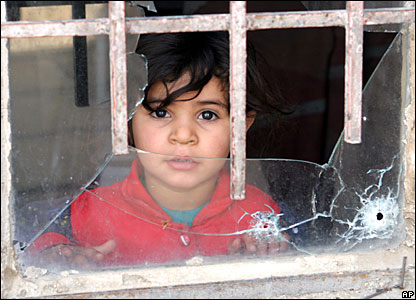The Government of Iraq and UNICEF launched the results of the most comprehensive survey on the situation of children and women in Iraq. It found that 32 per cent of children under 18 years of age are deprived of many basic services and rights.
“This survey provides extensive data on the situation of children and women in Iraq,” said Dr. Ali Yousif Al-Shukri, Iraq’s Minister of Planning.
"With these findings, we clearly see where we need to focus our investment in the new development plan to further improve the well-being of Iraqi children, who, representing half of Iraq's population today, represent Iraq's future tomorrow.”
A key finding of the survey is that major disparities exist between Iraq's 16.6 million children under 18 years of age over their access to health care and nutrition, education, water and sanitation, protection, shelter and information services.
Using an innovative methodology to determine issues each child experiences in different stages of life, 10 per cent of Iraq’s children – 1.7 million - were found to have access to all basic services and rights, while 32 per cent – 5.3 million – were found to be deprived of several at the same time.
“Not only do we now know that there are 5.3 million children deprived of many services but we know exactly which services they are,” said Iraqi Deputy Minister of Planning and Head of Iraq’s Central Statistics Organization, Dr. Mehdi Al-Alak.
“We can make a dramatic improvement in nearly all aspects of children’s well-being, and thus children's lives, by ensuring they benefit from policies that provide access to a comprehensive package of services they currently need.”
Other findings include: 99 per cent of children are currently registered at birth; the mortality rate of children dying in the first year of life is 32 deaths for every 1,000 live births, which translates into around 35,000 infant deaths every year; one in four children have stunted physical and intellectual development due to under-nutrition; while about nine out of 10 children enroll in and attend primary school, only four complete primary school on time; and 1 in 3 children – 3.3 million – are subjected to severe violent discipline methods.
“With this clear evidence on where progress for Iraqi children can be made, UNICEF looks forward to supporting the Government to develop national social policies, plans and interventions that concretely meet the needs of all of Iraq’s children, especially the 5.3 million most deprived and marginalized,” said Dr. Marzio Babille, UNICEF’s Representative to Iraq.
“In line with international commitments and accountabilities, our ambitious goal going forward is for an Iraq that is fit for all children.”
The survey – the Multiple Indicator Cluster Survey 4 - was developed over the past three years and is the fourth such survey in Iraq with previous rounds completed in 2006, 2000 and 1996.
More than 800 people from the Government of Iraq's Central Statistics Organization and the Kurdistan Region's Statistics Office interviewed 55,000 women from around 36,000 households in all of Iraq’s 118 districts.
UNICEF provided technical support to ensure the highest quality survey results, including the development of the methodology that enabled a deeper understanding of children’s disparities and deprivations across Iraq.
To Access the full report please use the download links below
https://www.yousendit.com/download/WUJaMFhvYXlsMHlVQU1UQw (Vol.1)
https://www.yousendit.com/download/WUJaMFhvYXk0b0RvS3NUQw (Vol. 2















0 Comments